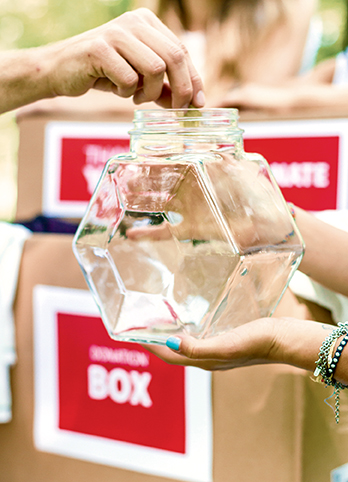It Improves the Lives of Others

Photo: iStock/fstop123.
Whether it’s donating to a micro-lending program to help a woman in a developing nation start a business to support her family, making a bequest in your will to fund research aimed at finding a cure for a devastating disease such as Alzheimer’s or pancreatic cancer, or contributing to a breakfast program that feeds hungry children in your hometown, giving to a non-profit or charity improves the lives of others.Experiments that attempted to isolate things that can enhance or dampen the joy we derive from giving have found that the feeling that you’ve made a difference helps amplify the effect, Aknin says.
Raising funds for projects such as the Simulation Centre, Traynor says, “gives me a feeling that I’m actually, tangibly doing good, and that I might change something for someone in my community.”
As a volunteer for several community organizations in London, ON, retiree Teresa Ainsworth gets to witness first-hand how charitable donations can make a difference, from providing meals and medical care to women who are homeless or at risk for homelessness at My Sisters’ Place, to funding music lessons and after-school snacks to children in El Sistema Aeolian’s program. “The kids learn skills to speak in public and get confidence because they’re performing,” she says, noting that some teens who graduate from the music program return as volunteer coaches and mentors.
Similarly, Jenny Hauser, a London, ON, yoga instructor and volunteer with St. John Ambulance Therapy Dog Program, has seen how a single encounter with an animal like her therapy dog, Mulligan, a golden retriever, can lift the spirits of long-term-care residents and university students who are away from home for the first time and struggling with loneliness and depression. “Just a one-hour visit can completely shift someone’s perspective of the day and even the week,” she says.
During one of Hauser’s regular shifts at Western University’s Student Health Services, a mature student who was feeling overwhelmed by stress and on the verge of withdrawing from classes “happened to see the sign that Mulligan and I were there and she just poured her heart out to me,” Hauser recalls. “Because of that visit, she didn’t end up quitting. She went home, thought about things, and became aware of initiatives that were there to help her.”
It Sets an Example
If you think a social conscience is undervalued in our modern society, you could be right. When Dr. Wael Haddara, an associate professor at Western University’s Schulich School of Medicine & Dentistry, and his colleagues examined 19 iterations of the Canadian Medical Association (CMA) code of ethics, from 1868 to 2004, the number of altruistic statements—asserting, for example, that physicians should treat people in an epidemic even at risk for their own lives—plummeted from 13 to zero.
“Altruism depends on societal expectations,” Haddara says, “and in response to those societal changes, people’s attitudes collectively change. The CMA code of ethics is a testament to that.”
Yet other research suggests that volunteering by older adults increases altruistic attitudes in younger people, and that generosity is contagious. Therefore, given that we come to realize as we age that relationships and a strong supportive community are what really matter in life, retirees are uniquely placed to set off a wave of kindness and generosity.
“By, as clichéd as it might sound, being the change you want to see, you can actually remake the world,” Haddara says.

Photo: iStock/PJPhoto69.
Ways of Giving
Not all of us are in a financial position to pledge thousands of dollars to fighting climate change or building a school in a developing nation. But that doesn’t mean you can’t contribute.
- Join a fundraising committee. While London, ON, lawyer Beth Traynor makes personal donations to charity, as chair of a committee that organizes an annual theatre event for charity, she has helped raise $55,000 over the past two years for women’s health at London Health Sciences Foundation.
- Leave a legacy. Consider making a bequest in your will or naming an organization you support as the beneficiary of your life-insurance policy.
- Make automatic contributions. As a writer and single mother who raised four children, Teresa Pitman of Guelph, ON, isn’t exactly wealthy, but she donates a small monthly sum to two non-profit organizations via automatic payment. “It’s painless, and at the end of the year, when I get the tax receipt, I think, Oh, that did add up,” she says.
- Contribute your skills. With a reduced work schedule and living on a modest income, “I have a reasonable amount of time, but not a lot of money,” says Teresa Ainsworth, of London, ON. A potter, she has made and donated mugs imprinted with the logo of My Sisters’ Place to that community organization, which, among other things, helps homeless women get into subsidized housing. “They sold the mugs and raised just over $2,000,” she says.




